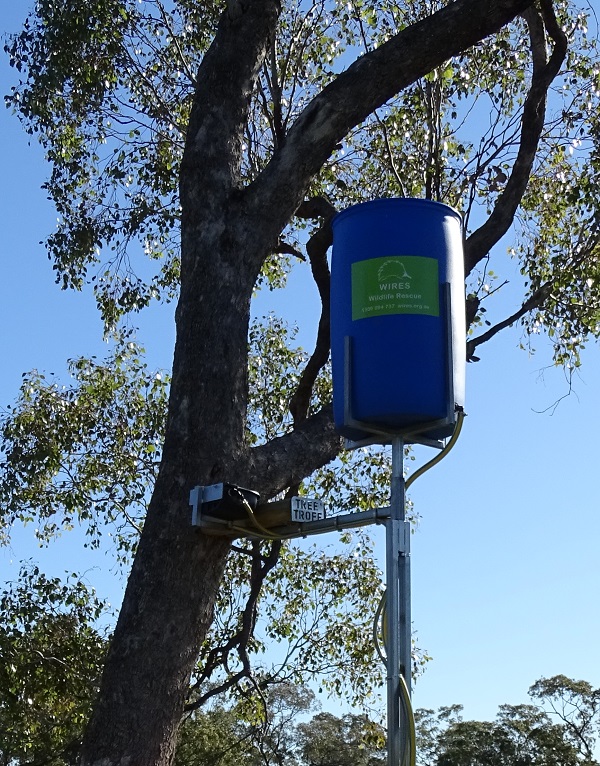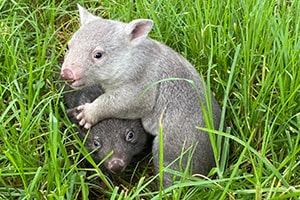Water For Wildlife Project
WIRES is calling on landowners in drought and fire affected areas with an interest in the welfare of local wildlife to apply for a Water for Wildlife drinker.
WIRES, Reece, Wildsip, WWF Australia, PaddlePop and the University of Sydney have partnered on a national project to provide long-term support to wildlife in by supplementing water via arboreal drinkers.
Applications extended
- Applications are open now - please apply as soon as possible
- Signed agreements are due to be returned within 1 week of receiving the offer of drinkers
Eligibility Guidelines
- Private and public landowners can apply.
- The applicant must be the owner of the land or have the authority to approve installation and ongoing monitoring of drinkers on the land.
- Applicants must be Australian citizens or permanent residents.
- Each drinker must be a minimum of 500 metres away from any other drinker/source of fresh water.
- Successful applicants will be required to sign an agreement confirming their commitment to the program.
- All applicants are expected to agree to: prompt installation, supplying pictures post-installation, completing ongoing long-term maintenance and providing ongoing monitoring feedback.
Program Overview
 800 drinkers are being provided free of charge to recipients in fire and drought affected areas, and in areas where drinkers will support wildlife recovery or minimise risk for wildlife re future emergencies. The aim is to have all drinkers installed before summer 2021, to benefit wildlife during our hottest months.
800 drinkers are being provided free of charge to recipients in fire and drought affected areas, and in areas where drinkers will support wildlife recovery or minimise risk for wildlife re future emergencies. The aim is to have all drinkers installed before summer 2021, to benefit wildlife during our hottest months.
- Drinkers will be allocated to applicants assessed to be in priority locations where the highest benefit will be delivered for wildlife.
- Priority will be given to areas impacted by the recent drought and fires and areas low on water. Remaining critical refuge areas will also be considered to support long-term wildlife recovery.
- Locations that will provide the best support for wild populations of arboreal species will be selected, not suburban backyards.
- Geographic spread of applicants will also be assessed as part the program's objective to maximise impact.
- Applicants need to be willing to be engaged in the program long-term, installing, regularly maintaining the drinkers and if appropriate, be willing to relocate them to areas of higher need.
- Successful applicants will become part of an evolving national community providing supplementary water, actively monitoring drinkers to assess the effectiveness of the program. This will determine the potential value to wildlife of ongoing program expansion.
- Maintenance including cleaning and refilling water is expected to be required every 5-8 weeks in drought conditions, less in winter or in rainy periods.
Why provide supplemental water?
Over the Black Summer of 2019/2020, long-term drought compounded by months of horrific fires took a tragic toll on native wildlife. Millions of hectares of habitat were destroyed, nearly 3 billion animals were lost or displaced and the long-term impact of these losses on biodiversity is still unclear.
According to the Bureau of Meteorology 2019 was Australia's hottest on record. Thankfully due to recent rain the coming fire season is expected to be less devastating than last year, however, the longer term climate forecasts are indicating that fire seasons will be longer and extreme weather events will continue to increase in frequency and intensity.
The Expert Panel appointed by the Federal Government assessed post-fires that 119 animal species were at the highest risk of potential extinction, including the koala. Focusing on how best to support wild populations longer-term WIRES began working with Dr Valentina Mella, Postdoctoral Research Associate - Animal Behaviour and Conservation, School of Life and Environmental Science at The University of Sydney in January 2020.
Dr Mella's past research had previously found that koalas used supplemented water extensively throughout the year, even during cooler months. Time spent drinking varied with season and depended on days since last rain and temperature. The more days without rain, the more time koalas spent drinking. When temperature was high, visits to water stations were more frequent, indicating that in hot weather koalas need regular access to free water. The arboreal drinkers were also regularly visited by other native animals including; sugar gliders, squirrel gliders, feathertail gliders, brushtail possums, tree frogs, geckos, pythons, a variety of birds including eastern rosellas, musk lorikeets, noisy miners, galahs, cockatoos, butcher birds, kites, apostle birds and magpies.
Working with Dr Mella WIRES began a million dollar Water for Wildlife project, thanks to the generous support of the global community this year to help wildlife post fires.
WIRES project is proudly supported by WWF Australia, Paddle Pop Koala, Robert Frend from Wildsip Pty Ltd who designed and produces the TREE TROFF® drinkers, Reece and their suppliers, who have generously donated many components enabling hundreds of additional drinkers to be provided.
To find out more please review these frequently asked questions.
Newsletter
Stay in touch and get our regular rescue stories, WIRES updates and a free copy of our 15 Ways to Help Wildlife ebook


